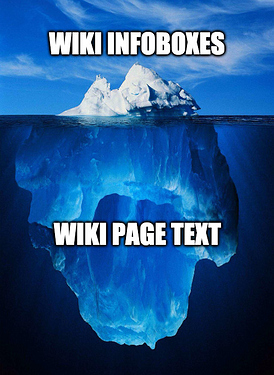Description
Every Wikipedia article links to a number of other articles. In DBpedia, we keep track of these links through the dbo:wikiPageWikiLink property. Thanks to them, we know that the :Berlin_Wall entity is semantically connected to 299 base entities.
However, only 9 out of 299 base entities are linked from :Berlin_Wall via also another predicate. This suggests that in the large majority of cases, it is not clear what kind of relationship exists between the entities. In other words, DBpedia does not know what specific RDF predicate links the subject (in our case, :Berlin_Wall) to any of the objects above.
Currently, such relationships are extracted from tables and the infobox (usually found top right of a Wikipedia article) via the Extraction Framework. Instead of extracting RDF triples from semi-structured data only, we want to leverage information found in the entirety of a Wikipedia article, including page text.
Goal
The goal of this project is to develop a framework for predicate resolution of wiki links among entities. The student may choose to focus on a specific kind of relationship:
- Causality. The direct cause-effect between events, e.g., from the text
The Peaceful Revolution (German: Friedliche Revolution) was the process of sociopolitical change that led to the opening of East Germany’s borders with the west, the end of the Socialist Unity Party of Germany (SED) in the German Democratic Republic (GDR or East Germany) and the transition to a parliamentary democracy, which enabled the reunification of Germany in October 1990.
extract: :Peaceful_Revolution –––dbo:effect––> :German_reunification
- Issuance. An abstract entity assigned to some agent, e.g., from the text
Messi won the award, his second consecutive Ballon d’Or victory.
extract: :2010_FIFA_Ballon_d'Or –––dbo:recipient––> :Lionel_Messi
- Any other direct relationship which is not found in DBpedia.
Material
The student may use any Python deep learning framework, but a neural approach is not strictly mandatory, and/or any existing tool for semantic parsing. The following resources are recommended for use in the project.
- Python Wikipedia makes it easy to access and parse data from Wikipedia.
- DBpedia Lookup is a service available both online and offline (e.g., given a string, list all entities that may refer to it).
- DBpedia Anchor text is a dataset containing the text and the URL of all links in Wikipedia; the indexed dataset will be available to the student (e.g., given an entity, list all strings that point to it).
- FRED is a tool for automatically producing RDF/OWL ontologies and linked data from natural language sentences. Unfortunately, an API key is required and the number of daily requests is limited, but it is a very inspiring project.
- An example of an excellent proposal that was accepted a few years ago. Please mind that the number of total project hours have changed from 300 to 175.
Impact
This project will potentially generate millions of new statements. This new information could be released by DBpedia to the public as part of a new dataset. The creation of a neural extraction framework could introduce the use of robust parsers for a more accurate extraction of Wikipedia content.
Warm-up tasks
- Get familiar with SPARQL on the DBpedia endpoint.
- Run a local DBpedia Virtuoso endpoint.
- Understand the science behind relation extraction.
- Use the FRED interface to parse a sentence from Wikipedia and analyse the generated graph.
